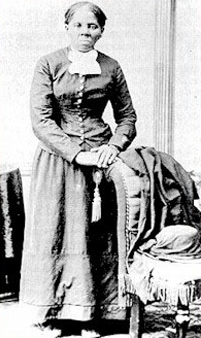Harriet Ross Tubman
1822-1913

Harriet Ross Tubman, was born into slavery in Dorchester County, Maryland, in 1822. In 1849, under fear of being sold to an owner in the Deep South, Harriet escaped to Pennsylvania and took work as a domestic in Philadelphia. There, she saved nearly all her money so she could return to Maryland in order to rescue friends and family still in bondage. Harriet never explicitly stated how many times she returned to Maryland to assist slaves to freedom, thus the actual amount of trips and runaway slaves is unknown.
Harriet established a network for runaways which stretched from Maryland’s Eastern Shore and the City of Baltimore, to locations through the north, such as Wilmington, Philadelphia, upstate New York, New England, and Canada. Her network included a highly influential corps of accomplices, including William Still, Lucretia Mott, and Thomas Garrett. Tubman would petition, give speeches, and implore people she came in contact with to give money and aid so she could continue returning to Dorchester County to rescue her family and friends.
Even at the outbreak of the Civil War, she signed up to aid the Union troops in hopes that the conflict would end slavery in America for good. As a cook, a nurse, a spy, and even military planner, Tubman advanced the cause of freedom on the front lines in the Army. Despite this participation, she was denied a military pension, only getting a nurse's pension after a protracted struggle with the U.S. government. She became active in the women's suffrage movement, and operated her home in Auburn, NY as a safe house for freemen who needed a place to stay.
Harriet Tubman's continual strikes against slavery in Maryland forced the issue to the forefront of the public's conscience, and shattered the myth that African-Americans were content in their degraded state. Many later legal and political advances were made possible by the strenuous efforts of Tubman and her dedicated accomplices. Though she passed away in 1913, Harriet Tubman left behind a complex story that is just as inspiring today as when she made her initial journey to freedom in 1849.
Biography courtesy of the Maryland Commission for Women, 1985.
